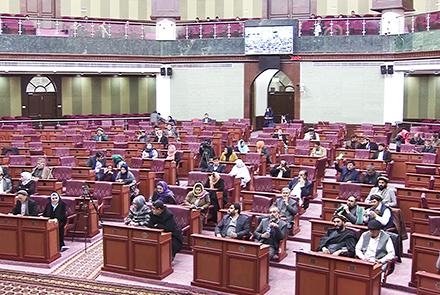The Wolesi Jirga, Lower House of Parliament, Speaker Abdul Rauf Ibrahimi said on Wednesday that more than 50 lawmakers have signed a petition to include the Census Law in their next agenda.
Ibrahimi said there are issues with the Census Law and that there is a need for more debates in this respect.
“This law (the census law) will be debated in the parliament in a different way from other laws. We, the administrative board, will work with complete neutrality and with complete respect to the Constitution,” said Ibrahimi.
Some MPs have meanwhile said President Ashraf Ghani’s decree, which was recently endorsed by the joint committee of the Wolesi Jirga, is against the identity of some ethnic groups and that they will not accept electronic identity cards which will be distributed in line with the decree.
“As a citizen who lives in this country, as a human who knows good and bad, I am not prepared to accept my identity card if it does not reflect my identity,” said Abdul Wali Niazi, an MP.
“There are agents who want to divide the people in the interest of Iran,” said Nasima Niazi, an MP.
“What makes it important if ethnicity is written on the card or not, what it can bring for us? This issue does not exist in the parliament, it is an issue between ARG (presidential palace) and the Chief Executive Officer Office,” said MP Farida Hamidi
“The president violates the law he himself approved and this indicates the political motives behind the move. It hides his failures and setbacks in the national and international spheres and creates division among the people,” said MP Ghulam Hussain Naseri.
The government has not a commented on the issue.
“Honorable chairman, we will not allow the law which is already approved, to be included on the agenda. If it happens, we also can say that it has been approved illegally,” said MP Kamal Naser Usuli
It was expected that the rolling-out process of electronic national identity cards would have started on Tuesday. However, a few days ago, rumors surfaced in the media that the process had been delayed because of political disagreements.
This comes after last week when more than 50 members of parliament signed a petition against the decision taken to include nationality and ethnicity in the new electronic National Identity Cards (e-NIC).
The MPs said the inclusion of such information was not necessary and urged the government to review the decision.
Following the establishment of the National Unity Government (NUG), President Ashraf Ghani approved the law for population registration, the census law, in which the inclusion of the nationality and ethnicity information was not included.
The law was then criticized by a number of people and the president issued a legislative decree stating that nationality and ethnicity information should be included.
The decree was rejected by Wolesi Jirga but was approved by Meshrano Jirga, the Upper House of Parliament.
To resolve the disagreements in this regard, a joint committee was formed by parliament and the Senate to decide on the issue. The committee approved the inclusion of nationality and ethnicity in the new electronic national identity cards.


